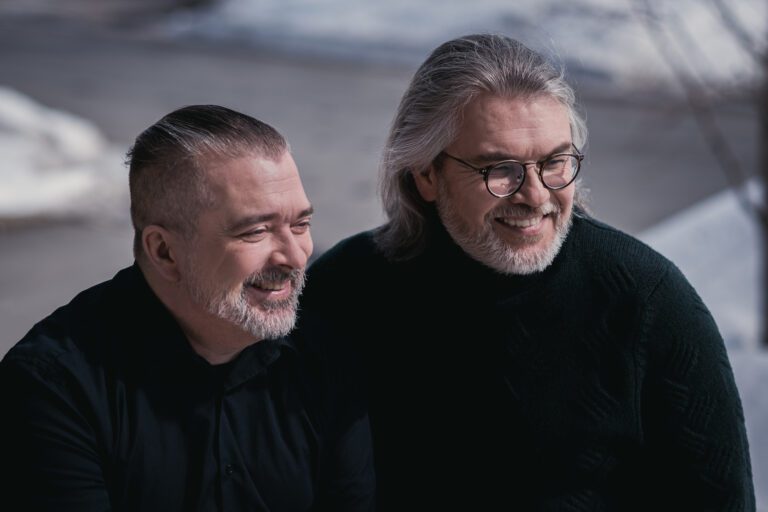Additional Information
Russian-Canadian composer Airat Ichmouratov will inaugurate the first opera produced under the banner of Nouvel Opéra Métropolitain (NOM), the new opera division of Festival Classica founded by Marc Boucher, with L’Homme qui rit, adapted from Victor Hugo’s novel by Bertrand Laverdure.
Featuring an all-Quebec cast including Hugo Laporte, Jean-François Lapointe, Janelle Lucyk, Sophie Naubert Magali Simard-Galdès, Florence Bourget, Antonio Figueroa and Boucher himself, this world premiere will be the first in a series of three opera premieres – Jules Massenet’s L’adorable Belboul on June 6th, and Théodore Dubois’s Miguela on June 14th. This marks the launch of a collaboration with the Salle Claude-Champagne of the Université de Montréal’s Faculty of Music for the next few years.
With Airat Ichmouratov and his production team in the home stretch before the premiere of L’Homme qui rit, we spoke to him.
PAN M 360 : Rehearsals for the performance of L’Homme qui rit have been underway for some time now. How are things going with the singers and musicians?
Airat Ichmouratov : I can say I’m really proud. We really have an extraordinary team. Everyone is so charismatic with great voices and a great attitude. Working with the Classica Festival and Marc Boucher, who has been so supportive from the start, and with all these musicians, is truly an incredible experience. We’ve already had a rehearsal with the orchestra. On Saturday we rehearsed with the singers, and after that we’ll have a dress rehearsal with everyone. The orchestra is excellent, the musicians are enthusiastic and excited about playing this new music. As a composer and conductor, it’s a real privilege to work with them.
PAN M 360 : On the one hand, to experience the world premiere of your first opera, and on the other, to be able to conduct it, must be extremely exciting, one imagines!
Airat Ichmouratov : Indeed, it’s something you don’t experience very often. It really brings to mind the old tradition of Richard Strauss or Gustav Mahler conducting their works. Nowadays, there aren’t many composers who conduct their works, although there are a few exceptions like John Adams. I’m really happy, because in my case I studied composition and conducting, and I’ve worked a lot as an opera conductor, particularly in Europe where I conducted several operas by Puccini Tchaikovsky and Verdi. I learned a lot from these works.
PAN M 360 : Tell us about the story behind L’Homme qui rit. What does it tell, and how did you come into contact with it and with Bertrand Laverdure, the librettist?
Airat Ichmouratov : read this book by Victor Hugo when I was 16. It’s a rather complex book, and not an easy one, because Victor Hugo always gives a lot of descriptions of the social and political situation of his time, but the story itself is extraordinary. The first thing is a story of love transcending appearances between Gwynplaine, a disfigured man, and Dea, a blind girl who sees in him only the beauty of her soul. The other thing is a story that illustrates the difference between wealth and poverty, which are still very topical subjects. Also, and for me this is very touching, it’s a story about acrobats, street musicians. When I came to Canada 25 years ago, I was a street musician for 4 years. I couldn’t get a job as an international student, so playing in the street was my only way of earning money. The story of Gwynplaine touches me for these reasons.
It was Marc Boucher who introduced me to Bertrand Laverdure. When I met Marc, I said, “Why don’t you create a new opera? He asked me right away if I had a subject in mind, and I said, “Yes, I have a subject. He told me he knew an extraordinary poet who could be the librettist, and from that moment on, he introduced me to Bertrand. Over the course of a year, and right in the middle of COVID, we talked a lot, and Bertrand wrote a first version of the libretto for the summer of 2021. I can say it was a great experience to work with him because Bertrand is an author with a very emotional pen, which for me was a very important element. His words are very inspiring. We formed a very good tandem for two years and I think the result is very good. I’m very happy with it. We are already discussing a new opera based on a work by Honoré de Balzac, for the 2026 edition of the Classica Festival.
PAN M 360 : What were your musical inspirations for setting Bertrand Laverdure’s words to music?
Airat Ichmouratov : My musical language is really romantic music. For me, it’s always a challenge, because in Romantic music, so much has been said that today, you compose something and it sounds like what already exists. So you’re bound to hear a lot of inspiration from a number of Romantic composers I’ve heard and who have marked out my career as a conductor and composer. People often refer to my music as neo-romantic. There’s always a lot of emotion involved, because for me, that’s extremely important. When you listen to music, you have to feel something. It may not necessarily be a good feeling, it may be frustration, anger, but it’s absolutely important to feel it. Because when you listen to music and don’t feel anything, for me it’s a disaster. The feeling and the emotion have to be there.
The world premiere of L’Homme qui rit, an opera by Airat Ichmouratov to a libretto by Bertrand Laverdure, adapted from Victor Hugo’s work, takes place on Wednesday May 31, at 7:30 pm at Salle Claude-Champagne, as part of the Festival Classica. Tickets are available here.
























